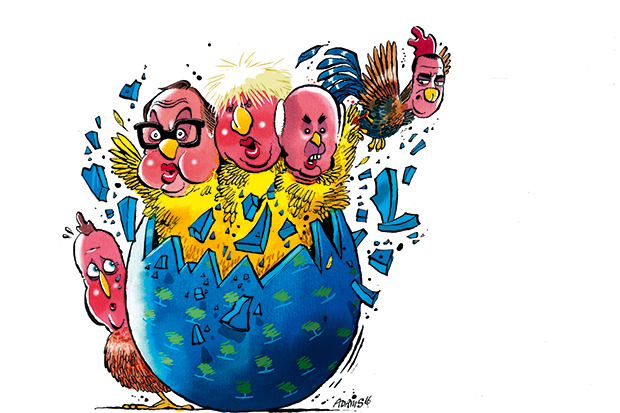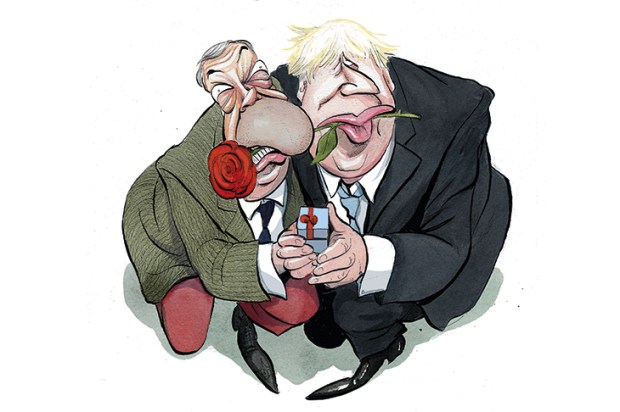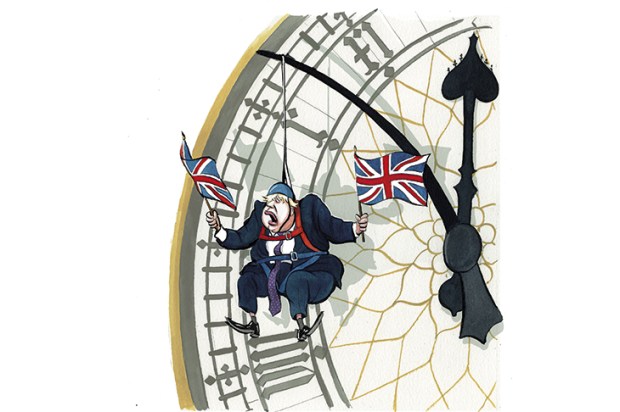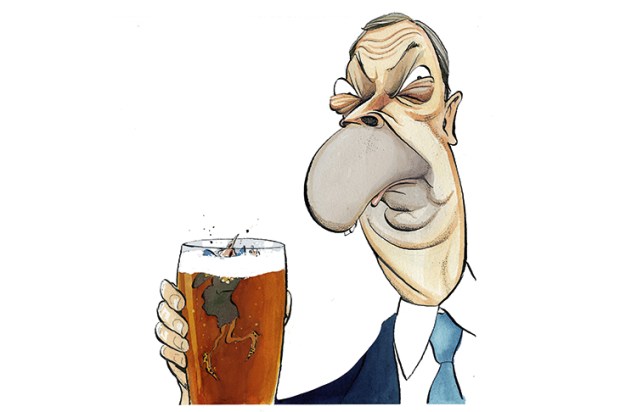No one does political violence quite like the Tories. The fall of Margaret Thatcher in 1990 unleashed a cycle of reprisals that lasted until David Cameron became leader in 2005. During that time, Tories specialised in factionalism: wets vs dries, Europhiles vs Eurosceptics, modernisers vs traditionalists. Cameron’s great achievement was to unite the party in pursuit of power. Now that unity is coming undone.
You can blame Jeremy Corbyn’s leadership of Labour for the latest Conservative breakdown. The Tory wars of the mid-1990s were fuelled by a sense that defeat was inevitable: since the Conservatives weren’t going to beat Tony Blair, they felt they might as well fight each other. This time round, the Tory wars are being stoked by a sense that the party can’t lose; that they will win the next election whatever happens. They look at Corbyn and conclude that they can knock lumps out of each other without fear.
Once, Iain Duncan Smith might have thought better of a public resignation that took aim at the very foundation of this government: the argument that it is reducing the deficit in a fair manner. As a former leader he knows better than most how disunity drags the party down. But with Labour not much more than a sideshow, he felt free to resign in order to make a political point about welfare reform. He has long complained — privately, and not so privately — that the protection of pensions had come at too great a cost to working-age benefits. He had implemented £33 billion of George Osborne’s cuts, he told Cameron, and couldn’t do any more.
His unease was exacerbated by the sheer number of spending statements recently — four in the past year alone. With the fiscal forecasts worsening, this latest Budget was always going to strain the delicate relationship between Osborne’s Treasury and IDS’s Department for Work and Pensions.
When John Major was handling Budget negotiations, he used to ask his colleagues to send their resignation threats in early. He saw such tactics as essentially bogus. Somewhere along the way, Cameron began to adopt a similar attitude to arguments with IDS. Before each Budget they would re-enact the same drama. The Treasury would demand more welfare cuts, and the Work and Pensions Secretary would protest — even hint at resignation — and in the end they’d muddle through. This time, however, the Prime Minister was distracted by Europe and did not intervene early enough in the process to prevent the drama from turning into a crisis.
But what makes IDS’s departure so dangerous to Tory unity is that it was about more than just welfare policy. It was about the style, point and purpose of Conservatism itself. His resignation was not directly about the EU, but to understand his motives, you must appreciate how the referendum is unbalancing the Tories. IDS has been heard to complain that the Prime Minister had become obsessed with Europe to the exclusion of domestic policy. The EU debate has weakened the ties that usually bind the party together. It has made Tory ministers and MPs quicker than ever to think the worst of their colleagues and created an atmosphere in which everyone is ready to snap. Without the strain of the referendum campaign, IDS might have been more prepared to compromise. The nerves of No. 10 would not have been so shredded. And Cameron would not have replied to a former leader’s resignation letter with an ill-advised escalation.
When Cameron ran for the Tory leadership ten years ago, Daniel Finkelstein — the Times columnist and former aide to William Hague, now a Tory peer — remarked that Cameron’s gang should be known not as the ‘Notting Hill set’ but the ‘Smith Square set’, since both Cameron and Osborne had worked in Conservative Central Office there. Professional experience more than social background is the key to understanding the current Tory tensions. Osborne and Cameron represent a new political class. They are professional politicians who went straight from university to Westminster.
As befits former Tory staffers, Cameron and Osborne believe in a strong centre. Neither has much time for the preoccupations of MPs. They want to focus their party on electoral realities. They both suffer from the deforming certainty of the political aide, projecting impatience towards those who disagree and a sense that life would be better if everyone would just do what they say.
Since the general election, when the Tory-led coalition turned into a majority government, their attitude has become even more centralising. No. 10 and No. 11 now govern the country as a duopoly: cabinet government has not been restored. The former Liberal Democrat minister David Laws found himself sat next to Duncan Smith in a BBC studio on Sunday, and was surprised to be told how much some Tories miss the Lib Dems. In the coalition era, Tories as well as their Lib Dem partners felt consulted. Now ministers such as Duncan Smith feel that they are simply told what to do. No politician appreciates making it to the Cabinet table only to find out that the real action is taking place elsewhere, and Duncan Smith is far from the only minister to have served under Cameron and Osborne who would describe themselves as ‘semi-detached’ from decisions about their own area of responsibility.
Such tensions should have been manageable, especially given that Cameron and Osborne had led the Tories to such an extraordinary and unexpected majority. After that triumph, all but the most implacable critics had to admit that these former special advisers knew what they were doing. But Cameron and Osborne seem to have counted rather heavily on that conclusion. In 2010, the Prime Minister and the Chancellor quickly realised they had to tread carefully with their party because they were in coalition. This time they felt they had earned the right to be obeyed.
They had reckoned without the issue of Europe, the greatest philosophical and emotional divide in the Tory party. The EU referendum is doing to the Tories what Iraq did to Labour: dividing the leader from almost half his MPs and the vast majority of his activists. And like Blair on Iraq, Cameron is emotionally invested in his strategy — and foolishly conceding nothing to his critics. He often sounds contemptuous of the Brexiteers, treating them as if they just don’t understand the realities of power in the modern world. That lack of respect is now returned.
It didn’t have to be this way. Earlier this year, Duncan Smith himself was privately arguing for a code of conduct for ‘out’ ministers. He wanted them to refuse to debate other Tory ministers on television, to swear off impugning their colleagues’ motives, and to avoid attacking the Prime Minister. For a while, No. 10 was keen to show gratitude towards IDS for being so constructive: he was the model internal opponent.
His attitude changed about six weeks ago, when the EU published the first draft of the proposed deal. The Prime Minister, ministers claim, told the cabinet he wouldn’t campaign for it until it had been agreed with them. But then he went straight off to a campaign-style event to make the case for his deal. Duncan Smith, always sensitive to slights, felt that he had been treated as a fool.
At this point, there may be no good referendum result for the Tory party. Cameron could win and yet struggle to reunite his forces afterwards. The party will feel as guilty about having confirmed Britain’s EU membership as it did about deposing Margaret Thatcher. But should the Brexiteers triumph, the Cameroons will believe their man has been stabbed in the back. Already, Tory ministers argue that a Boris Johnson leadership would be illegitimate because he would have attained the top job by embracing a cause, leaving the EU, which they claim he doesn’t really believe in.
Johnson is undeniably now the frontrunner for the Tory leadership. This means that he has a target on his back. One cabinet minister, an Osborne loyalist, tells me: ‘Someone has to stop the blond.’ They will have their work cut out, because the next Tory leader is to be selected by a vote of the full party membership. Countering Boris’s popularity among the grass roots in that final round will be extremely difficult for anyone who is not already an established figure. ‘John Major wouldn’t have won in 1990 under these rules,’ one Tory MP points out.
The danger for the Conservative party is that, as after 1990, it is entering an era where the legitimacy of the leader is not accepted. This is bound to cause instability.
Putting the party back together again will require a different approach from Cameron. The Smith Square set will have to listen more to their MPs. They will need to follow Douglas Hurd’s advice after the Westland affair and return to cabinet government. High on Cameron’s to-do list for the day after the referendum should be the appointment of a party chairman who can act as an honest broker between the leader and the party. The current chair, Andrew Feldman, is too close to No. 10 to serve that purpose; his links with Cameron go back to their shared Oxford college, Brasenose, where they organised a summer ball together. Cameron will need to show that he is proceeding with ‘malice towards none’, that there will be no revenge on the Brexiteers.
There will be those on Cameron’s side of the argument who ask why he should be conciliatory. As they would angrily point out, he took the Tories back into government after 13 years in opposition. He won them their first majority in 23 years. The party should let him lead.
But if the Cameroons want to know why they should heed the views of their internal opponents, they just need to look at the benches opposite. Tony Blair returned Labour to government after 18 years out of power, and delivered three successive election victories. Now his party is led by someone who defines himself in opposition to him and everything he did. If the Smith Square set are to avoid that fate, they will need to pay more heed to their members — both in Parliament and the country.
Got something to add? Join the discussion and comment below.
Get 10 issues for just $10
Subscribe to The Spectator Australia today for the next 10 magazine issues, plus full online access, for just $10.
You might disagree with half of it, but you’ll enjoy reading all of it. Try your first month for free, then just $2 a week for the remainder of your first year.















Comments
Don't miss out
Join the conversation with other Spectator Australia readers. Subscribe to leave a comment.
SUBSCRIBEAlready a subscriber? Log in